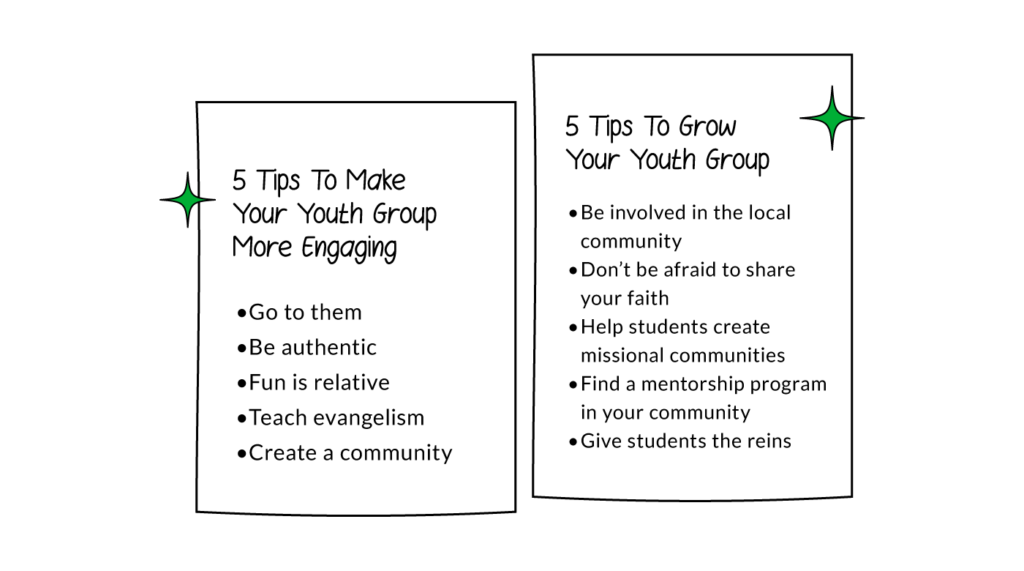The majority of churches get mired in the dilemma of how to build a youth group. It can be difficult to build a youth ministry from scratch, but with a bit of adjusting and clearly defined goals, it can be done! It's an important part of our efforts to fulfill the Great Commission. With some guidance, every church can have an opportunity to invest in a thriving youth ministry.
While there are church leaders who have invested in student ministry over and over again by building a variety of youth groups, most youth ministers don’t have the experience of decades of ministry to guide them. This does not make any church leader lesser, though, it just means you need to seek out some guidance from those who have gone before you.
We will start by defining the process of how to build a youth group followed up by discussing how to help your ministry program not just launch but thrive and grow!
I’ll cover:
How To Set Up A Youth Group
There are a million ways someone could go about building a youth group, but they all boil down to the same process: gather and invest.

1. Gather Your Youth Ministry
The largest issue facing those who are trying to figure out how to build a youth group is how to gather enough students to warrant the time, energy, and volunteer investment into the ministry program.
The Struggle For Young People
Let’s be honest here: most youth leaders tend to think, “if you build it, they will come.” However, experience has shown us this isn’t exactly true.
Young people today are bombarded with activities and expectations.
- They have to go to college, which means they need good grades
- They need to be in extracurricular activities to look good on college applications
- They need a job, for a variety of reasons
- They have to balance the social anxiety of life as a teenager in today’s society
- Most of them truly do want to follow Jesus
Do you see how difficult it is for them at this age? Just building a youth group, packing it with fun activities, and throwing them into a small group doesn’t automatically make it something worth giving up so much of their time and energy.
Start With New Believers and Outreach
The best thing we can do to start building a youth group isn’t to create a fun space that competes for their time and attention but to gather parents of teenagers to our church.
This is a real chicken and egg situation because most parents are looking for a church with a youth group for their teenagers and we need to find parents with teenagers to build a youth group.
Can I be honest again? This is because most people that are already Christians have it in their heads that going to church means having a youth group. This next generation of new believers, though, has grown up in a far less “church-y” world. For many of them, they fell in love with Jesus and want to know more and want their teenage children to know Jesus.
As you gather more new believers you will likely begin to see more high school and middle school students showing up on Sundays. Finding a volunteer to serve as a youth worker at this point will be critical. You will need someone to start investing in building relationships with these students and parents right away.
As you can, help parents and others understand that youth ministry is worth it and bring on some adult leaders that want to start investing in equipping, mentoring, and discipling these middle and high school students.
2. Invest In Your Youth Group
Now that you have gathered your people for your youth group like parents, adult leaders, students, and, hopefully, the beginnings of a leadership team, then you are ready to start focusing on investing in your students.
This is where fun activities can come back into play. Not to attract, but to build relationships with students. This is where a Bible study for students that are serious about following Jesus Christ comes into play along with a discipleship process, opportunities for service projects, mission trips, and mentoring.
The following sections of this article are a part of the invest step in the process of how to build a youth group. Let’s discuss how to lead a youth group well by creating an engaging environment and how to keep a healthy youth group growing!
How To Lead A Youth Group

Now that you know how to build a youth group, it’s time for you to understand how to invest in the growth of that ministry program. Whether you are a full-time youth pastor or someone in church leadership volunteering to keep leading, you have the same goal: keep growing.
Not just numerical growth, but the spiritual growth of your students, soon-to-be young adults, that will go and make more disciples. Below are some ways to help you keep leading by engaging and growing your youth group.
5 Tips To Make Your Youth Group More Engaging
- Go to them! Don’t just create your youth group as a place that students go to, but a community that goes out to others.
- Be authentic! Gen Z and Gen Alpha (those soon-to-be-middle school students) have built their generation on seeing straight through the smoke and mirrors. They don’t want you to try and be like them, they want you to be like you...so they can be themselves, too.
- Fun is relative! Youth groups up until the 2000s were built around dodgeball, gross food games, and other forms of competition. Gen Z and Gen Alpha don’t see as much value in competition as they do collaboration, so adjust your games and fun activities accordingly.
- Teach evangelism! There is a big difference between true evangelism and proselytizing. Help your students understand what it means to be Jesus to their friends, family, and random stranger without any pressure to “share the gospel” without first having a genuine relationship.
- Create a community! As I mentioned before, if you create a youth group as a place to go that is competing with their schedule, then you will lose every time. On the other hand, if the youth group is more about the community and less about teaching, preaching, music, etc., then it becomes an attractive option for them to exist and be authentic with themselves and others.
5 Tips To Grow Your Youth Group
- Be involved in the local community! You will always grow a healthy youth group much faster if parents and legal guardians are involved. So be an adult leader for your youth group in your community and invite parents to church.
- Don’t be afraid to share your faith! When I was in youth ministry and building a youth group I would never call myself a youth pastor when I met someone. I would often talk about the church I attend, though, and offer an invitation to others. You can talk about what is important to you without being pushy.
- Help students create missional communities! Do you have a group of students that love to knit? Help them start a knitting club at school! Students that like to play street basketball? Help them start a street league! Don’t make it a church-sanctioned event, but do fill it with students who want to intentionally share the love of God with their friends.
- Find a mentorship program in your community! A mentorship program that can get you a foot in the door of a school is a huge way for students to become familiar with who you are and to start building relationships with them.
- Give students the reins! Let them lead their own youth group, with help and support from adult leaders. Let them pray for one another. Let them plan games and activities. Let them teach! This is the best way for them to grow spiritually and the best way for your youth group to grow numerically.
Benefits Of Youth Groups
A youth group gives some pretty obvious benefits to the middle and high school students involved in the youth ministry:
- A Christian community
- A place to grow spiritually
- A way to connect with other students their age
Most of these benefits can be provided within the larger church body, though, right? So what is the benefit of a youth group? Why are we trying to learn how to build a youth group?
The reason: the non-student section of the church congregation needs the youth group.
We need youth groups because they give our church leaders and adult congregants a chance to pass on the baton. Not only in the way of passing on a tradition but in the way of how a person can learn something better by teaching it to someone else.
Youth groups are a huge benefit to the larger church body because they teach us so much about what it means to a follower of Jesus. It forces us to think about the way we talk, think, and engage with these students, which shapes our minds to be more like Jesus, too. Just as much as it helps form them, so it forms us.
Youth groups are a benefit to the church members because they are a constant reminder of what it means to continue to grow in a deeper relationship with God.
Now You Know How to Build a Youth Group, So Do It!
Seeing the steps and process of how to build a youth group can seem daunting when dropped into your lap. Being reminded of the benefit of the youth group with the church makes it seem less challenging, though.
There is so much more to talk about, so I hope that you stick around and check out some of the other content we have coming up on The Lead Pastor. If you are in the youth group training and preparing mindset right now, then might I recommend tackling some youth discipleship next? Read more about developing leaders out of your youth group, and making the process fun and engaging for participants. You can also find fundraising ideas for youth groups here.
What do you think? If you have any questions make sure and leave a comment and we will get back to you as soon as we can!


